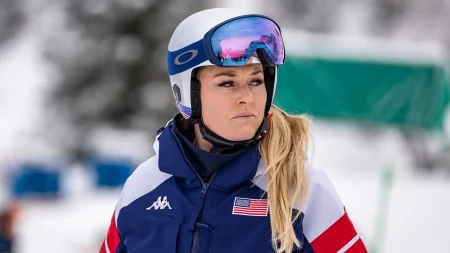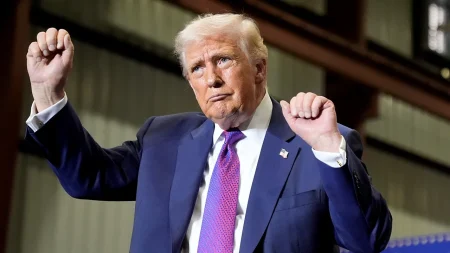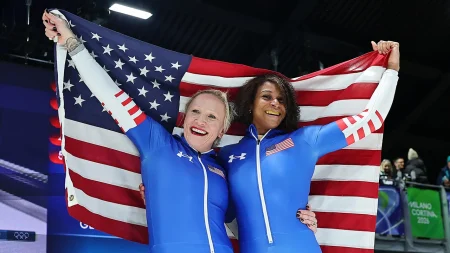Standing Her Ground: Alexa Anderson’s Fight for Women’s Sports Integrity
In the heart of Oregon, a young track athlete’s decision to step off the podium has ignited a national conversation about fairness, courage, and the future of women’s sports. Alexa Anderson made headlines earlier this year when she refused to share a podium with a transgender competitor at the Oregon state championships. Speaking on “America’s Newsroom,” Anderson delivered a powerful message to girls facing similar situations across the country: “It’s not fair and it’s not safe, and we have to stand up as the girls affected by this issue. It is our job to stand up and tell the people in charge that we are not OK with this and we want change.” Her words reflect not just personal conviction, but the growing sentiment among many Americans who believe female athletes should compete only against biological females in sports competitions.
The moment that thrust Anderson into the spotlight came after she and her teammate Reese Eckard finished third in the high jump at the state championships. Rather than accepting their medals alongside a transgender competitor, they made the difficult decision to step off the podium – a silent protest that spoke volumes and quickly went viral across social media platforms. This wasn’t a spontaneous act of defiance, but a carefully considered stand based on deeply held principles. “It was a very stressful moment,” Anderson reflected. “There were a lot of eyes on us. But in my heart, I knew that allowing biological men into women’s sports is not fair, and I had to take a stand for that for all girls who had been affected by it.” Despite the intense scrutiny and pressure of the moment, Anderson maintains she wouldn’t have done anything differently, believing the importance of the issue transcended her individual discomfort.
The aftermath of her protest revealed both the courage required to take such a stand and the divisive nature of the issue in today’s society. Anderson shared with Fox News Digital the difficult personal consequences she faced, including death threats and an extended battle with the Oregon School Activities Association just to receive her rightfully earned medal. This response illustrates how what began as a question of competitive fairness in high school sports has evolved into a broader cultural and political flashpoint that extends well beyond the track field. Yet despite the backlash, Anderson found herself buoyed by unexpected support: “While there has been a lot of negative talk and name calling, I have been overwhelmed with the support and kindness of so many people that it has been worth it. I just hope that we get change.”
The controversy takes place against a backdrop of shifting policies at both state and federal levels. While polling suggests most Americans agree with Anderson’s position on women’s sports, implementation of relevant policies varies widely across states. President Donald Trump’s executive order barring transgender athletes from competing against the gender they identify as represents one approach, but compliance and enforcement remain inconsistent nationwide. This patchwork of policies creates confusion for athletes, coaches, and athletic associations, leaving young women like Anderson feeling compelled to take matters into their own hands when they believe competitive fairness is at stake.
What makes Anderson’s story particularly compelling is that it highlights the human dimension of a debate often discussed in abstract policy terms. For her, this wasn’t merely a theoretical issue about transgender rights versus women’s sports protections – it was a lived reality affecting her athletic career and those of her teammates and competitors. The pressure she faced in making her decision was intense: standing on principle meant potentially facing criticism, ostracism, and even threats, while remaining silent would have meant tacitly accepting a competitive environment she believed was fundamentally unfair. That Anderson chose to speak up, knowing the potential consequences, reveals the depth of conviction felt by many female athletes caught in similar situations.
As the national conversation continues, Anderson’s experience serves as both a catalyst and a cautionary tale. It demonstrates how young women are increasingly willing to advocate for themselves when they believe their opportunities are being compromised, even in the face of significant social pressure. At the same time, the hostile response she received highlights the challenges of navigating these complex issues in a polarized climate. What remains clear is that Anderson’s quiet protest has achieved its fundamental purpose – bringing greater attention to concerns about competitive equity in women’s sports and inspiring others to speak up. “Just hope that we get change,” she said, encapsulating the fundamental motivation behind her actions. In the end, Anderson’s story is not just about a medal ceremony or a single competition; it’s about the ongoing struggle to define fairness and opportunity in women’s athletics for generations to come, and the courage required to stand up for those principles even when doing so comes at a personal cost.















